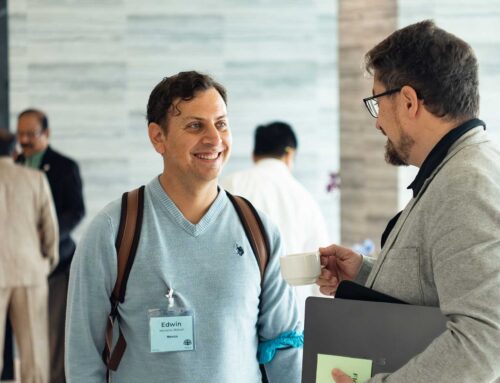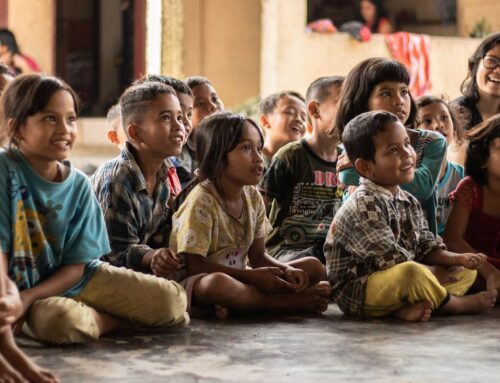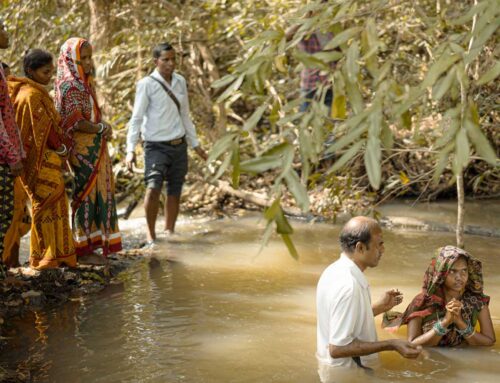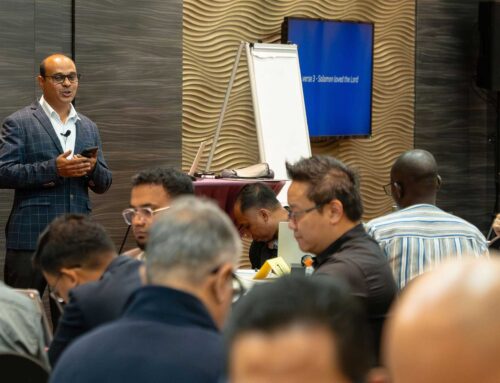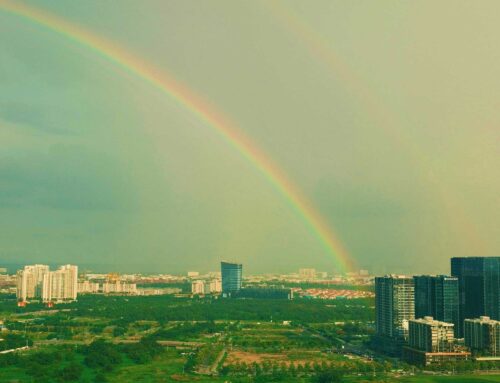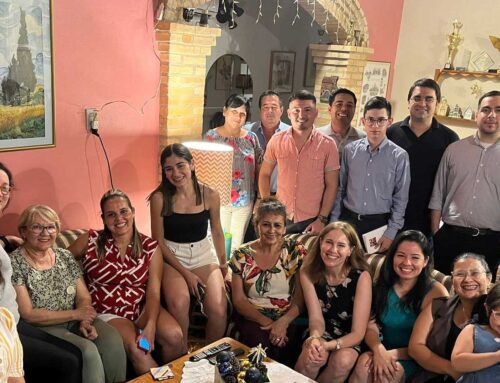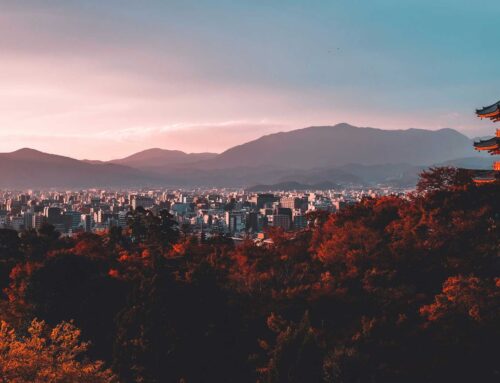A Place to Call Home
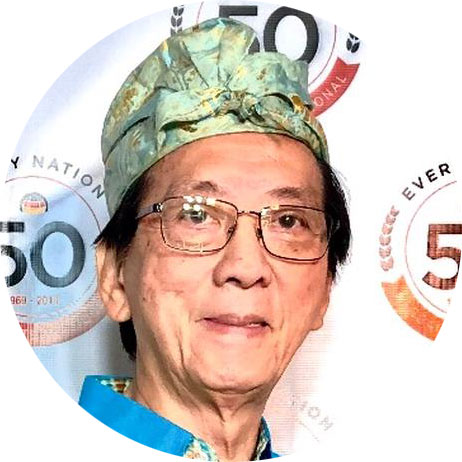 According to the World Bank, one fifth of Indonesia’s population lives in poverty, with one in five urban residents residing in slums. Over the last two decades, Habitat for Humanity Indonesia has partnered with families to improve their homes and lives through branches in Jakarta, Surabaya, Yogyakarta, and Batam.
According to the World Bank, one fifth of Indonesia’s population lives in poverty, with one in five urban residents residing in slums. Over the last two decades, Habitat for Humanity Indonesia has partnered with families to improve their homes and lives through branches in Jakarta, Surabaya, Yogyakarta, and Batam.
The vision of Habitat Indonesia is a world where everyone has a decent place to live, with Haggai leader, Jusuf Arbiato, at the forefront of this movement.
Jusuf is one of the six founders who established Habitat for Humanity Indonesia in 1997. A Christian non-profit, Habitat specializes in building homes for families as an implementation of the love of Christ in action. In 2018, Habitat Indonesia declared it intended to reach 100,000 families through support such as housing, market development, water, and sanitation programs.
In 2001, Jusuf attended the Haggai Leader Experience (HLE) in Maui. The HLE fueled Jusuf’s work with Habitat and empowered him to bring other potential leaders into the fold. Specifically, he encouraged his fellow Haggai leaders to share the Gospel not only among other professionals, but also in the poor, remote areas of Indonesia.
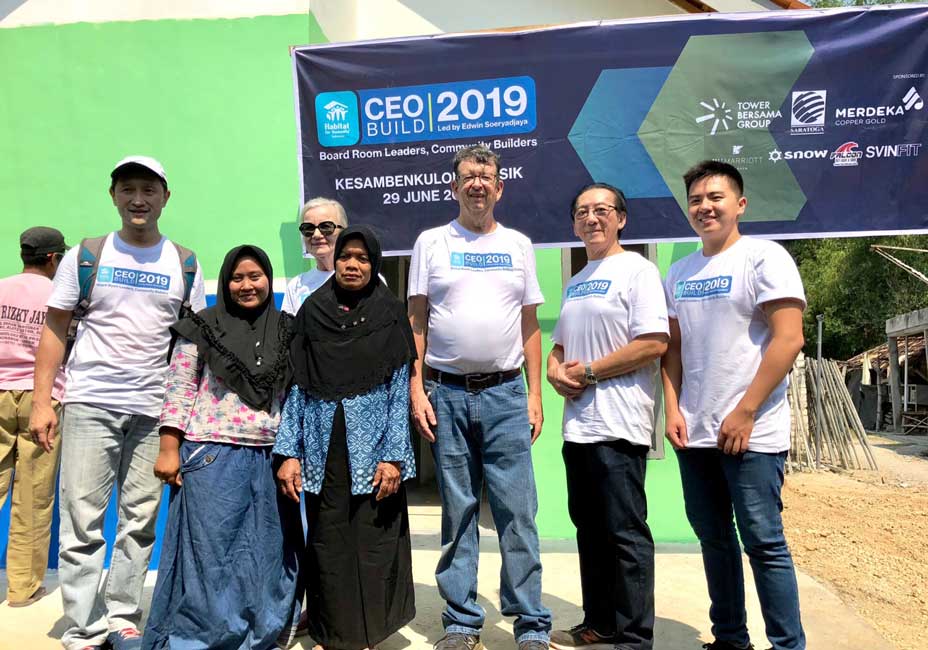
Jusuf (second from right) and his team, building homes in East Java.
“We should follow Mary, sister of Lazarus and Martha, from Bethany, who ‘sat at the Lord’s feet listening to what He said (Luke 10:39).’ She inspires us to ask ourselves, ‘How low can we go?’ While we conduct seminars at comfortable hotels with clean rooms and plenty of food, we also conform to His calling to serve villagers in remote areas, from the mountain tops of Toraja to the seashore of Tapanuli.”
Before the COVID-19 pandemic, Habitat Indonesia was on a path to complete their goal of serving 100K families by 2020. But economic constraints and public health restrictions slowed their work considerably, and they now forecast the goal will be completed in 2022. The pandemic has forced Jusuf, his Habitat colleagues, and his fellow Haggai leaders to pivot and adapt their ministry work. Reflecting on his experience from the HLE, Jusuf found the pandemic has strengthened his relationship with God and his ability to serve others.
“Before COVID-19, daily busy routines occupied our minds and consumed precious time. The pandemic shocked our lives, overturned daily routines, and forced us to stay and work from home. It was this fear and anxiety that led people to seek solace from distinguished pastors through their sermons. It was this worrying that has brought us closer to God.”
A Place to Call Home
 According to the World Bank, one fifth of Indonesia’s population lives in poverty, with one in five urban residents residing in slums. Over the last two decades, Habitat for Humanity Indonesia has partnered with families to improve their homes and lives through branches in Jakarta, Surabaya, Yogyakarta, and Batam.
According to the World Bank, one fifth of Indonesia’s population lives in poverty, with one in five urban residents residing in slums. Over the last two decades, Habitat for Humanity Indonesia has partnered with families to improve their homes and lives through branches in Jakarta, Surabaya, Yogyakarta, and Batam.
The vision of Habitat Indonesia is a world where everyone has a decent place to live, with Haggai leader, Jusuf Arbiato, at the forefront of this movement.
Jusuf is one of the six founders who established Habitat for Humanity Indonesia in 1997. A Christian non-profit, Habitat specializes in building homes for families as an implementation of the love of Christ in action. In 2018, Habitat Indonesia declared it intended to reach 100,000 families through support such as housing, market development, water, and sanitation programs.
In 2001, Jusuf attended the Haggai Leader Experience (HLE) in Maui. The HLE fueled Jusuf’s work with Habitat and empowered him to bring other potential leaders into the fold. Specifically, he encouraged his fellow Haggai leaders to share the Gospel not only among other professionals, but also in the poor, remote areas of Indonesia.

Jusuf (second from right) and his team, building homes in East Java.
“We should follow Mary, sister of Lazarus and Martha, from Bethany, who ‘sat at the Lord’s feet listening to what He said (Luke 10:39).’ She inspires us to ask ourselves, ‘How low can we go?’ While we conduct seminars at comfortable hotels with clean rooms and plenty of food, we also conform to His calling to serve villagers in remote areas, from the mountain tops of Toraja to the seashore of Tapanuli.”
Before the COVID-19 pandemic, Habitat Indonesia was on a path to complete their goal of serving 100K families by 2020. But economic constraints and public health restrictions slowed their work considerably, and they now forecast the goal will be completed in 2022. The pandemic has forced Jusuf, his Habitat colleagues, and his fellow Haggai leaders to pivot and adapt their ministry work. Reflecting on his experience from the HLE, Jusuf found the pandemic has strengthened his relationship with God and his ability to serve others.
“Before COVID-19, daily busy routines occupied our minds and consumed precious time. The pandemic shocked our lives, overturned daily routines, and forced us to stay and work from home. It was this fear and anxiety that led people to seek solace from distinguished pastors through their sermons. It was this worrying that has brought us closer to God.”
A Place to Call Home
 According to the World Bank, one fifth of Indonesia’s population lives in poverty, with one in five urban residents residing in slums. Over the last two decades, Habitat for Humanity Indonesia has partnered with families to improve their homes and lives through branches in Jakarta, Surabaya, Yogyakarta, and Batam.
According to the World Bank, one fifth of Indonesia’s population lives in poverty, with one in five urban residents residing in slums. Over the last two decades, Habitat for Humanity Indonesia has partnered with families to improve their homes and lives through branches in Jakarta, Surabaya, Yogyakarta, and Batam.
The vision of Habitat Indonesia is a world where everyone has a decent place to live, with Haggai leader, Jusuf Arbiato, at the forefront of this movement.
Jusuf is one of the six founders who established Habitat for Humanity Indonesia in 1997. A Christian non-profit, Habitat specializes in building homes for families as an implementation of the love of Christ in action. In 2018, Habitat Indonesia declared it intended to reach 100,000 families through support such as housing, market development, water, and sanitation programs.
In 2001, Jusuf attended the Haggai Leader Experience (HLE) in Maui. The HLE fueled Jusuf’s work with Habitat and empowered him to bring other potential leaders into the fold. Specifically, he encouraged his fellow Haggai leaders to share the Gospel not only among other professionals, but also in the poor, remote areas of Indonesia.

Jusuf (second from right) and his team, building homes in East Java.
“We should follow Mary, sister of Lazarus and Martha, from Bethany, who ‘sat at the Lord’s feet listening to what He said (Luke 10:39).’ She inspires us to ask ourselves, ‘How low can we go?’ While we conduct seminars at comfortable hotels with clean rooms and plenty of food, we also conform to His calling to serve villagers in remote areas, from the mountain tops of Toraja to the seashore of Tapanuli.”
Before the COVID-19 pandemic, Habitat Indonesia was on a path to complete their goal of serving 100K families by 2020. But economic constraints and public health restrictions slowed their work considerably, and they now forecast the goal will be completed in 2022. The pandemic has forced Jusuf, his Habitat colleagues, and his fellow Haggai leaders to pivot and adapt their ministry work. Reflecting on his experience from the HLE, Jusuf found the pandemic has strengthened his relationship with God and his ability to serve others.
“Before COVID-19, daily busy routines occupied our minds and consumed precious time. The pandemic shocked our lives, overturned daily routines, and forced us to stay and work from home. It was this fear and anxiety that led people to seek solace from distinguished pastors through their sermons. It was this worrying that has brought us closer to God.”


